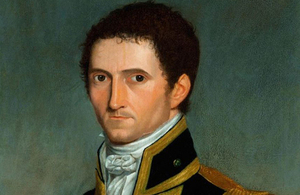The final voyage of Captain Matthew Flinders
Over 200 years after his death, Captain Matthew Flinders, the Royal Navy explorer discovered at St. James’s burial ground in Euston, will be going home to Lincolnshire.

Portrait painting of Matthew Flinders
HS2 Ltd’s Chief Executive, Mark Thurston, has written to the family of Captain Matthew Flinders to say that his remains can be reinterred in the local parish church of St. Mary and The Holy Rood. This follows a request made by the descendants of the Flinders family and the local community for his remains to be returned to the village where he grew up.
In January this year, archaeologists working on the HS2 project in Euston, London discovered the burial ground of the explorer as part of the archaeological works in advance of construction of the new high-speed terminus station. HS2 archaeologists were able to identify his remains by the ornate lead name plate placed on top of his coffin.
The Discovery of Captain Matthew Flinders
His final resting place will be in at the Church of St Mary and the Holy Rood in Donington, near Spalding, where he was baptised, and where many members of his family are buried. There is currently no set date for when his body will be reburied in at the church. However, the diocese of Lincoln has given planning consent to the reburial and, now HS2 have announced the news, the Parochial Church Council is expecting to work speedily to submit the details of a suitable memorial.
A specialist team from HS2 will transfer the remains to the Diocese of Lincoln for safekeeping until further burial arrangements can be made. Details of which will be announced at a later stage by the diocese.
Helen Wass, HS2 Ltd Head of Heritage, said:
It is fitting that the last voyage of Captain Matthew Flinders will be back to the village of Donington where he grew up and we are pleased to be playing our part in his last journey.
This local boy from Donington put Australia on the map due to his tenacity and expertise as a navigator and explorer. The Flinders name is synonymous with exploration, science and discovery, and HS2, through its archaeology programme, will ensure that we maximise the opportunities for further academic and scientific study.
Captain Flinders made several significant voyages, most notably as commander of H.M.S. Investigator which he navigated around the entire coast of Australia. This made him the first known person to sail around the country in its entirety, confirming it as a continent. He is also credited with giving Australia its name, although not the first to use the term, his work popularised its use. His surname is associated with many places in Australia, including Flinders Station in Melbourne, Flinders Ranges in South Australia and the town of Flinders in Victoria.
Press and media enquiries
Contact form https://www.hs2.org.uk...
The press and media enquiries line is for accredited journalists only